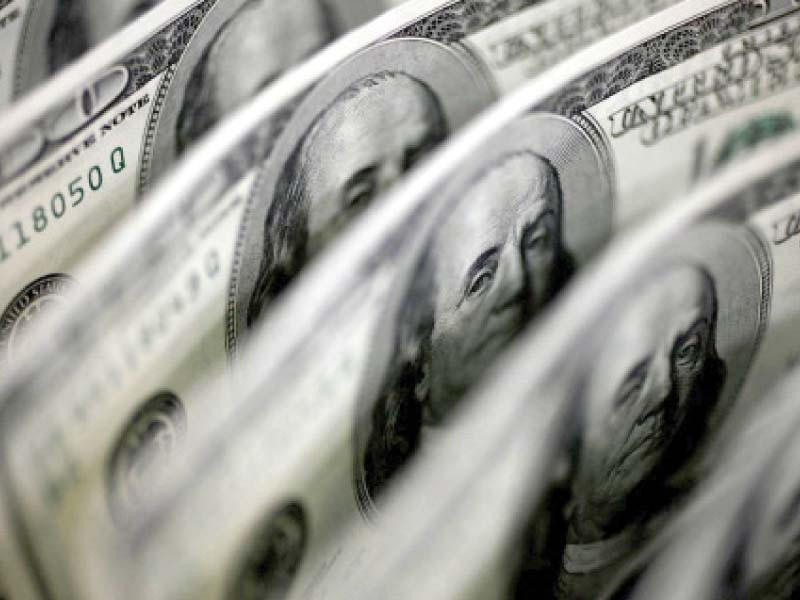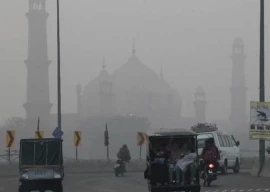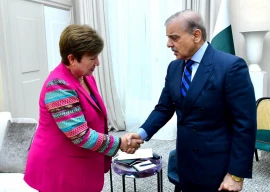
The International Monetary Fund (IMF) has reached a staff-level pact with Pakistan on a $3 billion stand-by arrangement, the lender said, a decision long awaited by the South Asian nation which is teetering on the brink of default.
The deal, subject to approval by the IMF board in July, comes after an eight-month delay and offers some respite to Pakistan, which is battling an acute balance of payments crisis and falling foreign exchange reserves.
Taking to Twitter to rejoice in the staff-level agreement, Prime Minister Shehbaz Sharif expressed hope that this is a step in the right direction.
"This arrangement will help strengthen Pakistan's foreign exchange reserves, enable Pakistan to achieve economic stability, and put the country on the path of sustainable economic growth," he wrote, thanking Finance Minister Ishaq Dar and IMF Managing Director Kristalina Georgieva.
Alhamdulillah, I am pleased to announce that Pakistan has reached a Staff-Level Agreement with the IMF on a nine-month US$3 billion Stand-By Arrangement. This Arrangement will help strengthen Pakistan’s foreign exchange reserves, enable Pakistan to achieve economic stability, and…
— Shehbaz Sharif (@CMShehbaz) June 30, 2023
Similarly, Federal Planning Minister Ahsan Iqbal termed the development “good news”.
"Let's resolve to implement TurnAround Pakistan 5E framework to make our economy strong and sustainable by developing it to its full potential," he wrote on Twitter.
Good news for now. IMF Reaches Staff-level Agreement with Pakistan on a US$3 billion Stand-By Arrangement.
— Ahsan Iqbal (@betterpakistan) June 30, 2023
Let’s resolve to implement TurnAround Pakistan 5E framework to make our economy strong & sustainable by developing it to its full potential. https://t.co/nbFeHp0s8A
Finance Minister Ishaq Dar too shared the IMF's press release on the staff-level agreement and thanked God.
AlhamdoLilah!https://t.co/Mv8N4bqZit
— Ishaq Dar (@MIshaqDar50) June 30, 2023
Meanwhile, reacting to the deal, former deputy governor of the State Bank of Pakistan (SBP) Murtaza Syed said, "The SBA (stand-by arrangement) provides Pakistan with much needed short-term cover, in the lead up to and immediate aftermath of the upcoming elections. As long as Pakistan remains on track under the SBA’s reviews, it should catalyze additional financing from bilateral and other multilateral sources.
"In this way, we should be able to meet the external debt repayments coming due in the next few months. It is not the end of our relationship with the IMF though, as the SBA is a short-term bridging operation. The new government will almost definitely need to negotiate another long-term EFF programme with the IMF after the elections, as our balance of payments and external debt repayment problems are of a more protracted nature," he added.
Read Petrol price may be slashed by Rs6.48 per litre
Similarly, Investment Company Arif Habib Ltd CEO Shahid Habib said, "The new 9-month SBA is a major positive and will significantly reduce risks and uncertainties and serve as a source of comfort to investors and lenders. It will also allow access to funding from other multilateral and bilateral partners which is essential given Pakistan has about USD 9.0 billion of debt repayments including USD 4 billion of sovereign rollovers until December".
Musadaq Zulqarnain, Chairperson of Interloop Holdings, one of the largest textile manufacturers in Pakistan, was hopeful that the agreement will at least provide some short term stability. "The 9 month SBA for $3 billion will bring some badly needed relief in the short term. Although the budget has created further difficulties for the corporate sector and the cost of doing business has gone out of the roof, the biggest problem has been the uncertainty and volatility in the market."
Meanwhile, Muhammad Sohail, CEO of Brokerage Firm Topline Securities said, "This new programme is far better than our expectations. There were a lot of uncertainties on what will happen after June 2023 as there will be a new government coming to power. Now, this funding of 3 billion dollars and for 9 months will definitely help restore some investor confidence".
In a similar vein, Ahfaz Mustafa, CEO of Brokerage Firm Ismail Iqbal Securities was hopeful that this a step in the right direction. "It also means that at this point no local/foreign restructuring of debt is on the cards. We have to wait for more details to come and see if any prior actions have to be fulfilled before the board meeting, but these are absolutely steps in the right direction for the economy."
Read More PSX shows signs of recovery amidst economic struggles
Sajid Amin Javed, deputy executive director of Sustainable Development Policy Institute Islamabad, took a more realistic view. "The SBA will come with even more tough conditions of sharp energy price hikes, completely market driven exchange rate, and others. But, Pakistan has no other way to come out of this crisis. We need IMF backing up. Things would have been much better if successive governments would have invested in completing the IMF programme. It will have avoided all the uncertainty, panic in market and pressure on currency," he said.
Similarly, South Asia Institute Director at The Wilson Centre Michael Kugelman observed that, “Islamabad waited until the very final hour to take the (politically risky) fiscal policy steps”. He added that if these steps had been taken earlier, “much of the drama and fraught negotiations of recent months likely wouldn’t have had to play out”.
Islamabad waited until the very final hour to take the (politically risky) fiscal policy steps that the IMF had been hoping to see for months. If it had taken those steps earlier, much of the drama and fraught negotiations of recent months likely wouldn’t have had to play out.
— Michael Kugelman (@MichaelKugelman) June 30, 2023
In his view, it was likely that when PM Shehbaz met with Georgieva in Paris last week, she delivered a "now or never" warning to him.
In all likelihood, when PM Sharif met the IMF director in Paris last week, she delivered a “now or never” warning to him. That message appears to have resonated and he appears to have delivered.
— Michael Kugelman (@MichaelKugelman) June 30, 2023

1731476617-0/Sandra-Oh-(2)1731476617-0-165x106.webp)


















COMMENTS
Comments are moderated and generally will be posted if they are on-topic and not abusive.
For more information, please see our Comments FAQ